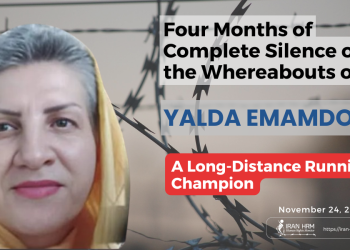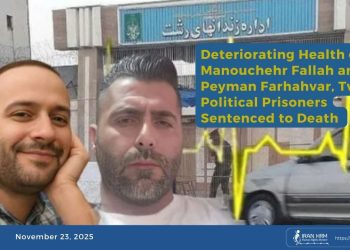Four political prisoners from the city of Izeh—Maziyar Nakouei, Ashkan Mohammadi, Farshid Kazemi, and Reza Karimnejad—have been held in Sheiban Prison in Ahvaz for nearly two years without trial or any formal judicial resolution. Their prolonged pre-trial detention, coupled with threats of solitary confinement and denial of basic rights, is a stark example of the systematic violation of human rights in Iran.
Hunger Strike: A Cry to Be Heard
In October 2024, these four prisoners went on hunger strike for the second time during their detention, in protest of their ongoing pre-trial imprisonment and lack of legal resolution. Instead of addressing their lawful demands, prison authorities responded with punitive transfer to solitary confinement—a move that clearly violates human dignity and the fundamental principles of human rights.
According to informed sources, the physical condition of the prisoners has deteriorated due to the hunger strike. Meanwhile, their families—deeply concerned for their health—are met with silence and evasion from prison officials. There has been no access to medical care, nor any transparency regarding their status.
A Case Without a Court: Arrests Under the Banner of “Security”
Reza Karimnejad was arrested in Isfahan on August 13, 2023, followed shortly by the arrests of Ashkan Mohammadi (from Ahvaz), Maziyar Nakouei (from Isfahan), and Farshid Kazemi on August 22, 2023. They were charged with typical allegations such as “propaganda against the regime” and “acting against national security”—charges frequently used to suppress dissent and silence activists.
More than 23 months have passed, yet no court hearing has been held, and the prisoners remain deprived of their right to defend themselves. A reliable source has reported that the Prosecutor of Izeh openly admitted that these cases have been removed from the jurisdiction of the local judiciary and are now under the control of higher security bodies, including the IRGC’s Intelligence Organization.
Political Prisoners: Hostages of the Repressive Apparatus
These four political prisoners from Izeh are not isolated cases. In recent years, the securitization of civil protests has led to countless similar arrests. Arbitrary detentions, prolonged pre-trial imprisonment, denial of legal counsel, lack of public trials, and ongoing psychological and physical pressure all constitute a pattern of systematic psychological torture against political dissidents and protesters.







